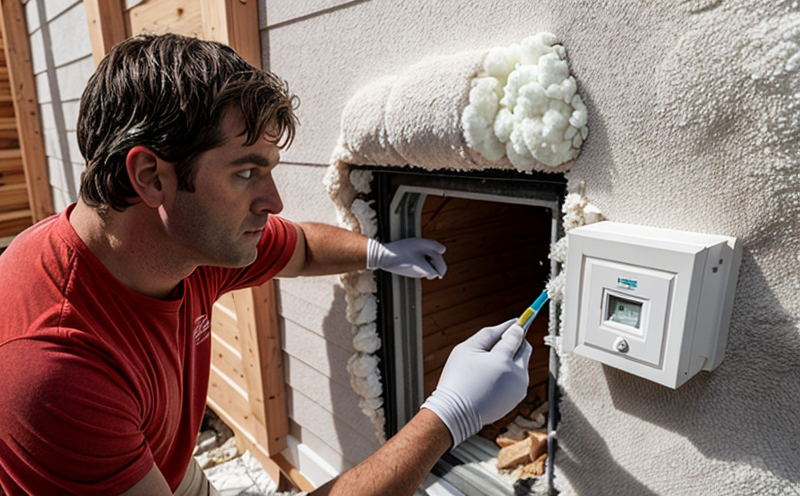ISO 8990 Determination of Thermal Conductivity of Insulation
The ISO 8990 standard provides a method to determine the thermal conductivity of insulating materials used in building and infrastructure applications. This service is crucial for ensuring that insulation products meet specified performance criteria, thereby enhancing energy efficiency and reducing heating and cooling costs.
Thermal conductivity is a measure of how well a material conducts heat. For insulations, it's critical to have low thermal conductivity because the primary function of these materials is to prevent heat from passing through them. This standard specifies detailed procedures for testing this property using a guarded hot plate apparatus. The test involves placing specimens between two plates that are maintained at different temperatures and measuring how much heat passes through the material over time.
The accuracy of such tests is paramount, especially in sectors where thermal performance can significantly impact energy consumption. For instance, in building design, choosing insulation with appropriate thermal conductivity ensures optimal HVAC system performance. In infrastructure projects like tunnels or bridges, proper insulating materials help maintain stable internal environments and reduce maintenance costs due to temperature fluctuations.
The test setup typically includes a heated plate on one side of the sample, a cooled plate on the other, and thermocouples positioned at various points within the specimen. The thermal resistance (R-value) is calculated based on the heat flow through the material. This method allows for precise quantification of insulation performance, which is essential for regulatory compliance and product quality assurance.
Real-world applications of this test include:
- Evaluating new insulating materials before market release
- Ensuring that existing installations meet current energy efficiency standards
- Comparing different brands or types of insulation to determine which offers better performance
- Demonstrating compliance with building codes and standards for new construction projects
In summary, the ISO 8990 standard plays a vital role in the quality control process by providing a reliable method for determining thermal conductivity. This service ensures that insulating materials perform as expected under various environmental conditions, contributing to sustainable practices across multiple sectors.
Benefits
The determination of thermal conductivity using ISO 8990 offers several key benefits:
- Enhanced Energy Efficiency: By ensuring that insulating materials have the correct thermal conductivity, buildings and infrastructure can achieve better energy efficiency. This results in lower heating and cooling costs.
- Regulatory Compliance: Meeting specified standards ensures that products meet national and international regulations, which is crucial for market entry and certification.
- Innovation and R&D: The precise measurement provided by ISO 8990 allows researchers to innovate more effectively, developing new materials with enhanced performance characteristics.
- Certified Results: Clients receive accurate test results that can be trusted for decision-making purposes. This is particularly important in competitive markets where product quality is a key differentiator.
These benefits translate into tangible advantages for businesses and end-users alike, contributing to both economic savings and environmental sustainability.
Eurolab Advantages
At Eurolab, we offer a comprehensive suite of services tailored to meet the needs of quality managers, compliance officers, R&D engineers, and procurement professionals. Our expertise in ISO 8990 testing sets us apart:
- Accurate Testing Equipment: We use state-of-the-art guarded hot plate apparatuses that adhere strictly to the requirements outlined in ISO 8990.
- Experienced Technicians: Our team comprises highly skilled professionals who are trained specifically for this type of testing, ensuring consistent and reliable results.
- Comprehensive Reporting: We provide detailed reports that not only contain the test results but also interpret them in context with relevant standards and industry best practices.
- Quick Turnaround Times: Clients can expect prompt service without compromising on quality or accuracy.
In addition to these technical advantages, Eurolab's commitment to customer satisfaction ensures that we are always available to answer questions and provide support whenever needed. This holistic approach guarantees that our clients achieve their goals efficiently and effectively.
International Acceptance and Recognition
The ISO 8990 standard is widely recognized across the globe, ensuring that results obtained through this method are accepted in multiple countries. Here’s a list of some key jurisdictions where this standard is used:
- Australia
- New Zealand
- United States
- Canada
- United Kingdom
- Germany
- France
- Italy
The international acceptance of ISO 8990 underscores its relevance and reliability in the global market. This widespread recognition means that businesses operating internationally can rely on consistent testing methodologies, fostering trust between suppliers and customers.





